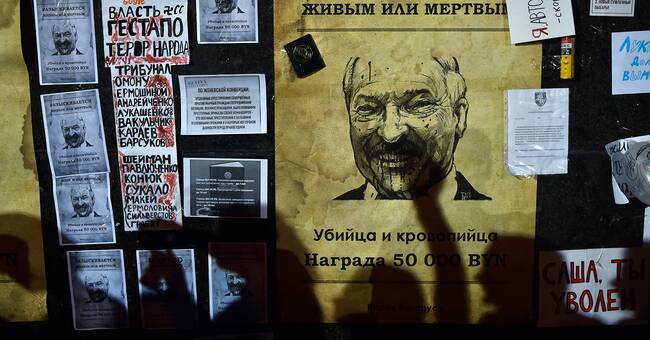The Majdan revolt had a clear goal: for Ukraine to free itself from Moscow's influence and instead approach the EU and the West. The spark for the street protests came when Ukraine's then-President Viktor Yanukovych suddenly decided not to agree to a broad cooperation agreement with the EU.
In Belarus, there is no national liberation struggle similar to that in Ukraine in 2014. The opposition is not campaigning either against Russia or for Europe. Here, the protesters are completely sonic, demanding that President Lukashenko resign and that free and fair elections be held.
This could at least theoretically mean that Putin is thinking ahead before deciding to deploy a military force in Belarus to try to keep Lukashenko in power. Such a move by the Kremlin risks alienating the Belarusians and instead fueling anti-Russian sentiment.
"Belarus far more authoritarian than Ukraine"In 2014, Ukraine was classified at least as partially free by the American organization Freedom House. The country certainly struggled with widespread corruption, but there was room for dissent and political opposition. In Ukraine there were also the oligarchs with their great political influence as a factor.
Belarus is in practice a totalitarian regime, far more authoritarian than Ukraine was or is. The KGB security service is holding the population in an iron grip, and the country still has the death penalty. In 2006, President Lukashenko issued a public warning that anyone participating in a protest action would be treated as terrorists.
"We will turn our backs on them, as we do with ducks," Alexander Lukashenko said at the time.
Many point to major differences between Ukraine and Belarus in how organized the protesters are. In Ukraine, there was a well-functioning civil society that played a major role in the protest movement, not least in the beginning. In addition, opposition politicians in the Ukrainian parliament, the Verkhovna Rada, were able to use their party resources and networks to support the revolution.
In Belarus, several leading opposition figures have been imprisoned or forced to flee the country. Not a single opposition politician is sitting in Parliament, which still has extremely limited powers, and civil society works in very difficult circumstances. There are also no clear leaders for the protests, although this is changing.
"It is difficult to see Ukraine as a map for Belarus' future"Pavlo Sydorenko, who took part in the Majdan protests, tells Deutsche Welle that he wishes the demonstrators in Belarus all the best, but that the various factions must work together if they are to succeed.
- Majdan was like an anthill where everyone did their job as well as they could, says Pavlo Sydorenko.
These differences should be borne in mind when comparing Belarus 2020 and May 2014. And they make it difficult to see Ukraine as a possible map when trying to predict the way forward for Belarus.

